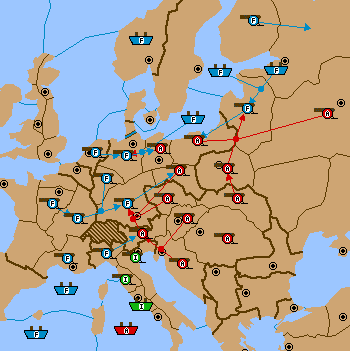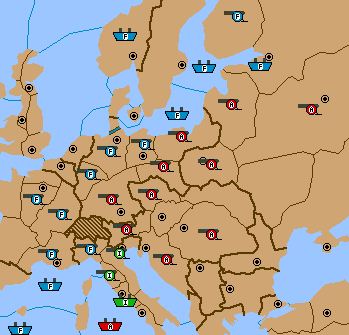


Austria's best reply seems to be what we will call "AC".
Austria's Counter (to the French Attack)
A Tyo - Mun A Boh S A Tyo - Mun A Sil S A Tyo - Mun A Ber - Kie A War - Lvn A Mos S A War - Lvn A Pru S A War - Lvn A Gal - War A Vie - Tyo A Tri S A Vie - Tyo

Verify that Austria takes Munich and Livonia, loses Berlin, and otherwise the position is essentially the same, with a couple of backrank units replacing forward ones that have moved up.
The new position we can call the "French Berlin" position. France has traded Munich in on Berlin, and lost his advanced army in Livonia.
French Berlin:
AUSTRIA: A Tyrolia, A Bohemia, A Munich, A Silesia, A Prussia, A Livonia, A Moscow, A Warsaw, A Trieste, A Vienna, A Budapest.
FRANCE: A Berlin, A Kiel, A Ruhr, A Burgundy, A Piedmont, A Marseilles, F Gulf of Lyon, F St. Pete(sc), A Finland, F Norway, F Gulf of Bothnia, F Baltic, F North Sea, A Paris.

 Now, we could assess this position (though in point of fact, we will not).
Think for a few moments: is this position an improvement over France's
earlier position, which we may call "French Munich"? If you think of the
Mun-for-Ber swap as being a wash, then surely France's position has
deteriorated a bit, since she has lost her foothold in Livonia. But you may
think that she could regain that foothold, eventually, without any real
risk. (You'd be right, too.) Is the Mun-for-Ber swap a wash, is it a
positionally even trade, or is it better for France to be in Berlin, or worse?
Click here when your pencil is back on your desk.
Now, we could assess this position (though in point of fact, we will not).
Think for a few moments: is this position an improvement over France's
earlier position, which we may call "French Munich"? If you think of the
Mun-for-Ber swap as being a wash, then surely France's position has
deteriorated a bit, since she has lost her foothold in Livonia. But you may
think that she could regain that foothold, eventually, without any real
risk. (You'd be right, too.) Is the Mun-for-Ber swap a wash, is it a
positionally even trade, or is it better for France to be in Berlin, or worse?
Click here when your pencil is back on your desk.

